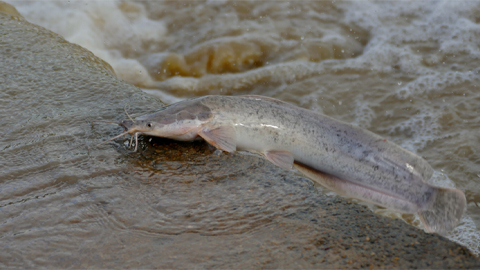Catfish skin mucus yields promising antibacterial compound
Scientists report they have extracted a compound with powerful antibacterial properties from the skin of farmed African catfish. Although additional testing is necessary to prove the compound is safe and effective for use as future antibiotic, the researchers say it could one day represent a potent new tool against antimicrobial-resistant bacteria such as extended-spectrum beta-lactamase (ESBL) producing E. coli.
Hedmon Okella is a postdoctoral researcher at the University of California, Davis, and led the project.

“The global public health threat due to antimicrobial resistance necessitates the search for safe and effective new antibacterial compounds,” Okella said. “In this case, fish-derived antimicrobial peptides present a promising source of potential leads.”
Okella will present the new research at Discover BMB, the annual meeting of the American Society for Biochemistry and Molecular Biology, which is being held March 23–26 in San Antonio.
For the study, the researchers extracted several peptides (short chains of amino acids) from African catfish skin mucus and used machine learning algorithms to screen them for potential antibacterial activity. They then chemically synthesized the most promising peptide, called NACAP-II, and tested its efficacy and safety on ESBL-E. coli and mammalian blood cells, respectively.
These tests showed that NACAP-II caused the bacteria to break open, or lyse, without appearing to harm the mammalian blood cells. “Preliminary findings indicate that this promising peptide candidate potentially disrupts the bacterial cell envelope to cause lysis at a very low concentration,” Okella said.
The place where the peptide was found — in the mucus on the skin of farmed African catfish — is not as unlikely as it may seem. As anyone who has tried to hold one can attest, fish are enveloped in a slippery layer of mucus. This mucus is known to protect the fish against infections by physically carrying germs off of the skin and by producing antimicrobial compounds such as the one Okella’s team isolated.
Many existing medicines are based on compounds that were first found in nature, and scientists speculate that marine and aquatic organisms represent a particularly rich — though largely untapped — source of bioactive compounds.
As a next step, the researchers plan to study the peptide’s effects in animal models and explore strategies to produce it inexpensively.
“We are currently utilizing chemical synthesis to upscale the production of this peptide that we believe will one day be of use as drug candidate in the battle against antimicrobial resistance,” Okella said.
Hedmon Okella will present this research from 4:30 to 6:30 p.m. CDT on Sunday, March 24, in the exhibit hall of the Henry B. González Convention Center (Poster Board No. 86) (abstract).
Enjoy reading ASBMB Today?
Become a member to receive the print edition four times a year and the digital edition monthly.
Learn moreGet the latest from ASBMB Today
Enter your email address, and we’ll send you a weekly email with recent articles, interviews and more.
Latest in Science
Science highlights or most popular articles

Avoiding common figure errors in manuscript submissions
The three figure issues most often flagged during JBC’s data integrity review are background signal errors, image reuse and undeclared splicing errors. Learn how to avoid these and prevent mistakes that could impede publication.

Ragweed compound thwarts aggressive bladder and breast cancers
Scientists from the University of Michigan reveal the mechanism of action of ambrosin, a compound from ragweed, selectively attacks advanced bladder and breast cancer cells in cell-based models, highlighting its potential to treat advanced tumors.

Lipid-lowering therapies could help treat IBD
Genetic evidence shows that drugs that reduce cholesterol or triglyceride levels can either raise or lower inflammatory bowel disease risk by altering gut microbes and immune signaling.

Key regulator of cholesterol protects against Alzheimer’s disease
A new study identifies oxysterol-binding protein-related protein 6 as a central controller of brain cholesterol balance, with protective effects against Alzheimer’s-related neurodegeneration.

From humble beginnings to unlocking lysosomal secrets
Monther Abu–Remaileh will receive the ASBMB’s 2026 Walter A. Shaw Young Investigator Award in Lipid Research at the ASBMB Annual Meeting, March 7-10 in Washington, D.C.

Chemistry meets biology to thwart parasites
Margaret Phillips will receive the Alice and C. C. Wang Award in Molecular Parasitology at the ASBMB Annual Meeting, March 7-10 in Washington, D.C.

